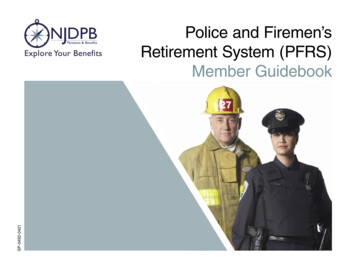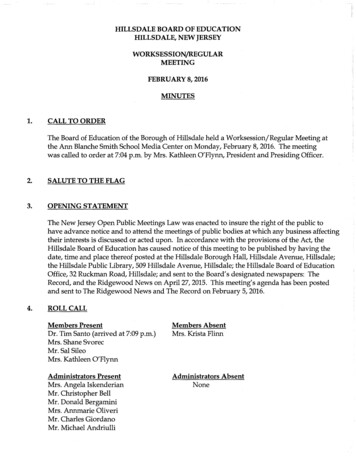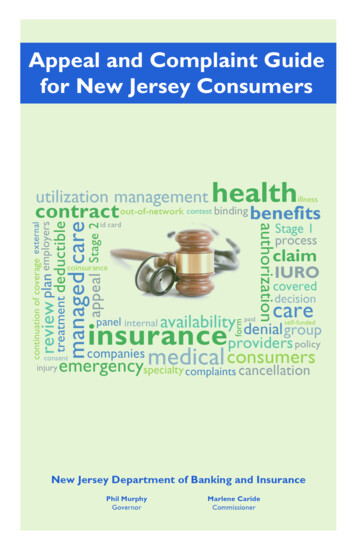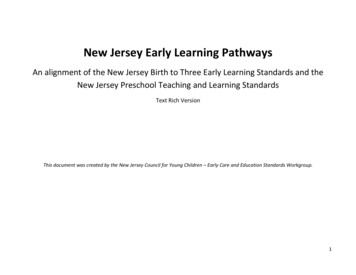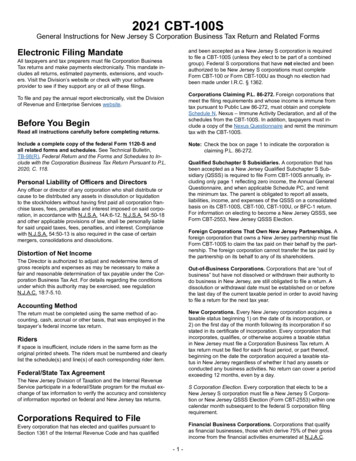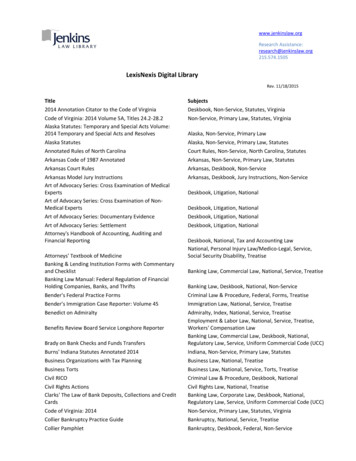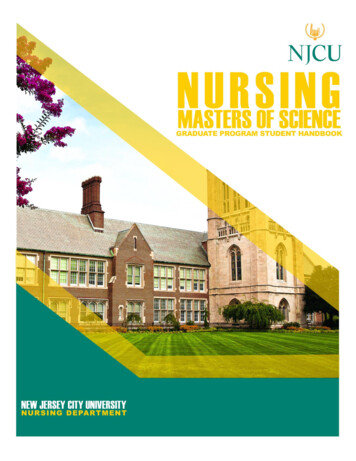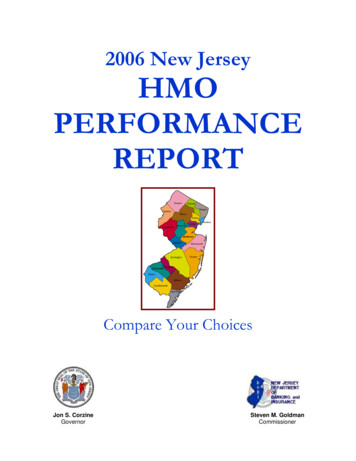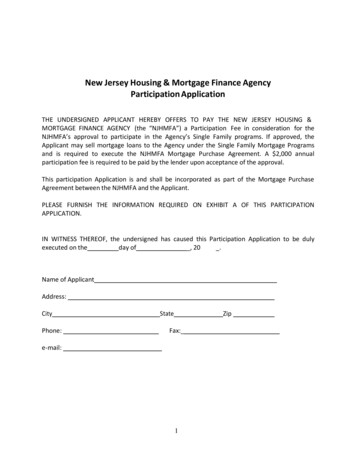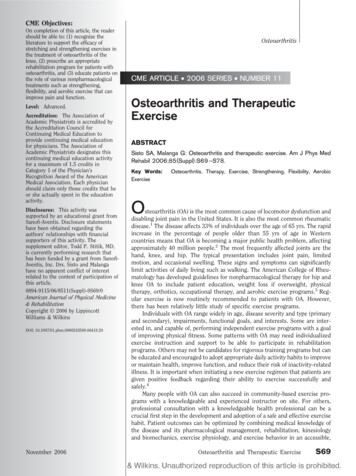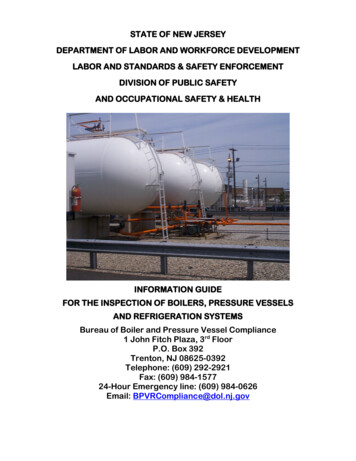
Transcription
STATE OF NEW JERSEYDEPARTMENT OF LABOR AND WORKFORCE DEVELOPMENTLABOR AND STANDARDS & SAFETY ENFORCEMENTDIVISION OF PUBLIC SAFETYAND OCCUPATIONAL SAFETY & HEALTHINFORMATION GUIDEFOR THE INSPECTION OF BOILERS, PRESSURE VESSELSAND REFRIGERATION SYSTEMSBureau of Boiler and Pressure Vessel Compliance1 John Fitch Plaza, 3rd FloorP.O. Box 392Trenton, NJ 08625-0392Telephone: (609) 292-2921Fax: (609) 984-157724-Hour Emergency line: (609) 984-0626Email: BPVRCompliance@dol.nj.gov
This page left blank intentionallyVersion 1-2.3.2020Page 2
WHO IS THE BUREAU OF BOILER AND PRESSURE VESSEL COMPLIANCE?The Mechanical Inspection Bureau of Boiler and Pressure Vessel Compliance (MIBBPVC) is anagency found within the Department of Labor and Workforce Development in the Division of PublicSafety and Occupational Safety & Health. This bureau originated in 1913 to promote greater safetyto life and property through the uniformity of construction, installation, operation, inspection, repair,maintenance, and inspection of boilers and pressure vessels.WHAT EQUIPMENT DOES THE MIBBPVC INSPECT?In accordance with the provisions established by the boiler, pressure vessel, and refrigeration law(BPV&RL) known as New Jersey Statutes Annotated (N.J.S.A.) N.J.S.A. 34:7-14 inspections shall bemade of the equipment falling under the jurisdiction of the MIBBPVC. Vessels subject to test andinspection are boilers, pressure vessels and refrigeration systems that meet the inspection criterionestablished by the BPV&RL. This statute specifies that all steam or hot water boilers or similar pressureequipment potentially capable of generating steam must be inspected, and those that haveadequate relief devices set to discharge at:1. A pressure of 15 or less pounds per square inch gage (psig); or2. A hot water boiler having adequate relief devices set to discharge at a pressure of 160 psig orless, and which hot water boilers are reliably limited to temperatures of 250 F or less.a. When such steam or hot water boilers serve dwellings of less than six-family units orother dwellings with accommodations for less than 25 persons. The threshold capacityb. for boilers is 10 kilowatts (kW) or 40, 000 British thermal unit per hour (Btu/hr) and onlywhen the boiler serves (supplies) six-family units or more or any other type dwelling withaccommodations for more than 25 persons.3. Pressure vessels are also inspected and are subject to test after installation and periodically atsuch intervals as established by rule. (See N.J.A.C. 12:90-3.11 and N.J.A.C. 12:90- subchapter5.) More detailed information regarding pressure vessel inspections can be found fromviewing the “Advisory Regarding New Rule and Regulation on Pressure Vessel Inspectionsand the “General Pressure Vessel Inspection” document.4. A refrigeration system is inspected when any of the following conditions is found: 1Systemsusing refrigerants of a flammable nature as classified by ASHRAE 34 as an A2, B2, A3, or B3 ortoxic according to ASHRAE 34 as B1, B2, or B3 that is rated over three tons of refrigeratingcapacity; 2Systems using refrigerants that are flammable or toxic as determined by ASHRAE34 above requiring over 6 driving horsepower or more; 3Systems using refrigerants of a nonflammable classified by ASHRAE 34 as A1, A2 or A3 and nontoxic classified by ASRAE 34 as A1,or B1, over 18 tons refrigerating capacity or more; 4Systems using refrigerants of anonflammable and nontoxic nature as classified by ASHRAE 34 above requiring over 36driving horsepower or more; 5Systems using refrigerants of a nonflammable and nontoxicnature as classified by ASHRAE 34 above operating over 15 psig or more, regardless ofcapacity.Equipment not inspected is any boiler or pressure vessel under the jurisdiction of and control of theUnited states Government or used solely for the propulsion of motor vehicles regulated by Title 39 ofthe Revised Federal Statute.Version 1-2.3.2020Page 3
WHAT IS USED TO SIGNIFY THAT THE EQUIPMENT IS FIT FOR OPERATION & COMPLIES WITH STATE LAW?When an equipment owner receives a satisfactory inspection, the MIBBPVC registration processrequire a jurisdiction number assignment to identify the equipment in the State. To validate theinspection, the MIBBPVC issues a Certificate of Inspection (Certificate) to the owner of theequipment. The jurisdiction number assigned to the equipment is located in the upper left-mostcorner of the Certificate. It is the responsibility of the equipment owner to affix the jurisdictionnumber to the equipment in a secure and permanent manner. The issued number is nottransferable to any other equipment.The Certificate must be framed and posted where equipment is located or in a facility or plantoffice and must be visible and prominently displayed, and available upon the request of theMIBBPVC or any other state or local agency. When a Certificate is missing, other state and localcode inspectors may have the owner contact the MIBBPVC to ascertain the condition of theequipment for public safety.Failure by the owner to display the Certificate could cause a penalty assessment to be issued by theMIBBPVC at a minimum fine of 500 and a maximum of 5,000 for each day in violation. The fee fora replacement Certificate is 32.00 for a boiler and 30.00 for a pressure vessel or refrigerationsystem. The number to call to request an inspection or to report a lost certificate is (609) 777-4636.WHO PERFORMS THE INSPECTIONS?The BPV&RL allows inspections by insurance companies who conduct business in New Jersey andwho employ inspectors that are certified and specifically trained in boiler and pressure vessel safety.Insurance company inspectors by law must report their inspection activity to the MIBBPVC. Theyperform between 70% to 80% of the inspections in the State.The statutes require that inspection of boiler, pressure vessel and refrigeration equipment occur atregular intervals. Select boiler equipment must receive internal inspections annually with some onlyneeding an external inspection. Refrigeration plants receive inspections annually as well. Pressurevessels are inspected at the intervals recommended by the Codes and Standards adopted byreference wherein minimum inspection interval for pressure vessels may be 3 up to 5 yearsdepending upon the vessel use, age and mechanical integrity. The initial safety inspection usuallydetermines the interval. All equipment may be subject to additional inspections at the discretion ofthe inspector, when the as found condition of the vessel warrants additional inspections.WHAT ARE THE QUALIFICATIONS OF THE INSPECTORS?Under the authority of the Commissioner of Labor and Workforce Development, the MechanicalInspection Bureau Examining Board must administer an examination to all inspectors in accordancewith the provision of N.J.S.A. 34:1-44-1-45.Inspectors must be familiar with the statutes, the regulations and have worked either in the field ofboiler or pressure vessel construction, fabrication, quality assurance, boiler and power plantoperation, maintenance or repair.Version 1-2.3.2020Page 4
WHAT CODES AND STANDARDS ARE USED IN NEW JERSEY AND WHAT TYPE OF SERVICE IS PROVIDED BY THE AGENCY?It is generally understood that a boiler or pressure vessel has the potential to explode, cause loss oflife and tremendous damage to structures and equipment. Thus, the MIBBPVC has in the NewJersey Administrative Code (N.J.A.C.) 12:90 adopted by reference the following consensus Codesand Standards – The American Society of Mechanical Engineers (ASME) Construction Codes forboilers and pressure vessels, the American Petroleum Industry (API) Standard for pressure vesselsinstalled and operated in the refinery and petrochemical industry. By adopting these safety codesand standards, the MIBBPVC ensure the best protection is provided to the public for new pressureretaining equipment. After construction, safety is assured for the useful life of the vessel by enforcingthe National Board Inspection Code (NBIC) and the pertinent ASME and American PetroleumIndustry API Fitness for service, operation, inspection and maintenance codes.The MIBBPVC maintains an Accreditation as an ASME Authorized Inspection Agency for Section I, IV,and VIII Div. 1, and 2, 3 of the ASME Boiler and Pressure Vessel Code. Maintaining this accreditationallows the MIBBPVC to perform shop inspections (third party) inspection services to those New Jerseymanufacturers that request such service. Maintaining such a service is a mandate of the BPV&RL atN.J.S.A. 34:7-15.The following is a listing of industry that have equipment regulated by the BPV&RL : Private and Public Schools Nuclear and Fossil Fuel Power Plants IPP (Independent Power Producers) or Co-Generation plants Boiler and Pressure Vessel Manufacturers for New Construction and Repair Firms Small to Large Industry (Pharmaceutical, Manufacturers, Mills, Warehouses, Food ProcessingPlants etc.) Oil Refineries Chemical Plants Hospitals, Medical Centers, Universities Heating and Process Plants Dry Cleaning Stores and Garment Plants Commercial Business (Offices, Spas, Fitness Centers, Supermarkets, Shopping Centers, Malls,Department Stores) Casinos, Hotels, Motels, Multiple-Dwelling Units Housing Authorities, Apartments (Include High-Rises, and some Condominiums) Places of Public Assembly (Stadiums, coliseums, theaters, churches etc.) Ice Plants; Ice Rinks Municipal complexes, including Housing Authorities, Fire/Police and Community Centers.Listing of Services Provided by the MIBBPVC ASME Accreditation as an Authorized Inspection Agency to provide Quality AssuranceProgram (QCP) for boiler and pressure vessel industry through implementation andmonitoring of quality control inspection systems during the manufacturing process.Promotes the establishment of manufacturing, maintenance, and repair standards forboiler, pressure vessel and refrigeration safety.Version 1-2.3.2020Page 5
Listing of Services Continued In accordance with the BPV&RL, establish criterion for the licensing of inspectors,Stationary (steam, power plant, cogens), and refrigeration engineers, and boileroperators.Develop and implement license examinations current with technology trends forStationary and Refrigeration Engineers and boiler operators.Administer and oversee stationary, refrigeration engineer and boiler operator’slicense examination throughout the state.Provide to the public and industry safety and hazard alerts and other pertinentinformation related to ensuring public safety and health.Plan and conduct training seminars for insurance inspectors and code enforcementgroups.Investigate accidents and code compliance issues for boiler, pressure vessel andrefrigeration plants under the jurisdiction of the MIBBPVC.Create specific rules and regulations for the enhancement of safety in boiler, pressurevessel and refrigeration plants in New Jersey.Has representation on the American Society of Mechanical Engineers (ASME), theNational Board of Boiler and Pressure Vessel Inspectors (NBBPVI) and vote on consensusStandards affecting industry in New Jersey.FREQUENTLY ASKED QUESTIONS (FAQS)Q What is a Boiler?A Boiler means a closed vessel in which water is heated, steam is generated, steam is superheated,or any combination thereof, under pressure or vacuum for external use by the direct applicationof heat. The term “boiler” shall include fired or waste heat systems for heating or vaporizingliquids other than water where these systems are separate from processing systems and arecomplete within themselves.Q What is a pressure vessel?A A pressure vessel is similar to a boiler except that the pressure that makes it hazardous is obtainedfrom an external source. It is defined as a vessel in which the pressure is obtained from anexternal source, or by the direct application of heat from a direct or indirect source. ExistingPressure Vessels must be built to Codes and Standards adopted by reference as established bythe provisions of N.J.A.C. 12:90.Q What is the requirement for the safe operation of pressure vessels in New Jersey and how oftenmust they be inspected?A. Pressure vessels out number boilers by a ratio of about 3:1, thus safe installation, operation,maintenance and repair are mandatory. The inspection requirements is established under theprovisions by law at N.J.S.A. 34:7-14 et seq., and promulgated by regulation at N.J.A.C. 12:90-5.Q Who is responsible for ensuring pressure vessels are installed, maintained, repaired andinspected?Version 1-2.3.2020Page 6
FAQs continuedA The statutes established under the provisions of N.J.S.A. 34:7-26 that the owner, lessee, seller oroperator has this ultimate responsibility and if they “sell, use, cause or allow to be used suchequipment specified (boiler, pressure vessel, refrigeration system or similar equipment) in violationof any provision of the article shall be liable to a penalty assessment of not less than 500 normore than 10,000 for each first offense and not less than 500 nor more than 25,000 for eachsubsequent offense.”. In addition, the regulatory provisions at N.J.A.C. 12:90-5.2 “Compliancewith reference standards” specifies the codes and standards adopted by reference in N.J.A.C.12:90 for pressure vessels and in paragraph 5.2(a) it states “Unfired pressure vessels shall beconstructed, installed, maintained, repaired and inspected in accordance with the standardsadopted by reference.” The MIBBPVC adopts these codes and standards and they aremandated for use by all responsible parties. The codes and standards ASME, NB, and API havethe specific safety elements and requirements for the owner, user, operator, installer etc. tofollow. The MIBBPVC enforces these safety requirements and elements in New Jersey.Q What is a Refrigeration system?A Refrigeration system means a system that is a combination of interconnected refrigerantcontaining parts constituting one closed refrigerant circuit in which a refrigerant is circulated forthe purpose of extracting heat. Refrigeration applications generally fall into five categoriesbased upon their design function. These refrigeration designs may be grouped as 1domestic,2commercial, 3industrial, 4marine and transportation; and 5air conditioning.Q When should I contact the MIBBPVC for an inspection of my equipment?A To be compliant with the BPV&RL equipment falling under the authority of the BB&VC must beinspected prior to its use. According to the BPV&RL, an owner should contact the MIBBPVCwithin thirty-days of an installation. The MIBBPVC will assign an inspector and in some cases canexpedite the inspection of equipment.Q What size boilers have to be inspected by the state?A Boilers with a capacity that equals or exceeds; 110 square feet of heating surface; 210 kilowatts or40,000 Btu per hour when those vessels serve a dwelling unit of six or more families or otherdwellings unit that may have accommodations for 25 or more people.Q How often is a boiler and refrigeration system inspected in the State and what signifies that aninspection is valid and satisfactory?A In accordance with the provisions established by the BPV&RL at N.J.S.A. 34:7-25 boiler andrefrigeration plants shall be inspected at 12-month intervals. Hot water heating boilers byregulation at N.J.A.C. 12:90-4 shall be inspected internally at 24-month intervals and eternally at12-month intervals. Annual inspections are necessary for all steam boilers falling under theinspection criteria established by the BPV&RL. Whenever conditions warrant and in some cases,more frequently when abuse or unsafe conditions are noted, a six-month internal or externalinspection is made on any system falling under the jurisdiction of the MIBBPVC. The MIBBPVCissues a Certificate when an inspection is satisfactory. This Certificate must be displayedprominently under glass in the plant office or equipment room. Failure to properly post anddisplay the Certificate could subject the owner to a penalty assessment issued by the MIBBPVCfor violation of the BPV&RL.Version 1-2.3.2020Page 7
FAQs continuedQ Are there provisions for a pressure vessel owner-user to establish an in-house inspection program?A Yes, the regulations N.J.A.C. 12:90-3.19 specifies the requirement to become an Owner-userinspection agency. (Contact the MIBBPVC and request an Owner-User Inspection agencypackage)Q Are Pressure Vessels hazardous as boilers?A It is obvious when viewing national accident reports that pressure vessels are hazardous whennot properly maintained. Reports such as those published by National Board of Boiler andPressure Vessel Inspectors (NBBPVI) at their website, www.nationalboard.org, detail inspectionand accident activity across the United States and Canada. In New Jersey, no accidentreporting mechanism exists to document a type of incident to a particular type vessel, eventhough boiler and pressure vessel incidents may occur. The Mechanical Inspection Bureau doespublish periodic data regarding incidents in which they are involved. A copy of this data can beobtained by contacting them at the email address given on the cover page.Q When are Water Heaters inspected?A Water Heaters are inspected when they equal or exceed the following: 1a heat input of 200,000Btu per hour; 2a water operating temperature of 200 F; 3a nominal water capacity of 120 gallons.The water heater must also be serving a dwelling unit of six or more families or other dwellingsunits that may have accommodations for 25 or more people.Q What type of refrigeration system is inspected?A Refrigeration/Air Conditioning systems are inspected when they meet the criteria as follows:1Systems using refrigerants of a flammable, highly toxic nature of over three tons or more ofrefrigerating capacity; 2Systems using refrigerants of a flammable, highly toxic or toxic naturerequiring over 6 driving horsepower or more; 3Systems using refrigerants of a non-flammable andnontoxic nature of over 18 tons refrigerating capacity or more; 4Systems using refrigerants of anonflammable and nontoxic nature requiring over 36 driving horsepower or more; 5Systems usingrefrigerants of a nonflammable and nontoxic nature operating over 15 psig or more, regardlessof capacity.Q When a new installation of a boiler is to be performed, what are the owner and the municipalcode official’s responsibility?A The UCC N.J.A.C. 5:23 (Uniform Construction Code) is the municipal officials’ code. An ownermust obtain the appropriate permits from the municipality. For a TCO/CO (temporary certificateof occupancy/certificate of occupancy), the UCC code must be followed. The boiler regulationat N.J.A.C. 12:90-4.2 references N.J.A.C. 5:23-3.20 for guidance and at N.J.A.C. 12:90-4.10“Inspection of Boilers”, the boiler regulations detail what size of equipment falls under thejurisdiction of the MIBBPVC. The statutes at N.J.S.A. 34:7.2 stipulate that it is the owner’sresponsibility to provide proof of inspection. However, the municipal official should let the ownerof the equipment know that they must obtain an inspection by the MIBBPVC. When new orreplacement equipment is installed, the owner has 30 days to notify the MIBBPVC so that aninspector can be dispatched to perform the inspection and register the equipment. New orreplacement equipment inspections shall only be performed by the MIBBPVC. In some cases,you may not be able obtain a TCO or CO until this inspection is satisfied. The owner may selectthe state or have an authorized insurance company inspector perform all subsequentinspections at their location.Version 1-2.3.2020Page 8
FAQs continuedQ How much are the inspection fees for field inspection of boiler, pressure vessels and refrigerationsystems inspected by the State.A The fees is in accordance to the following schedule:BoilersTen and not over 60 square feet60 and not over 1,000 square feet1,000 square feet and over 160.00 220.00 300.00Pressure VesselsVessels up to 30 square feetVessels over 30 but not over 60 sq. ft.Vessels over 60 but not over 100 sq. ft.Vessels over 100 sq. ft. 40.00 80.00 120.00 160.00RefrigerationOver three and under 25 tons25 tons and over, but not less than 300 tons300 tons and over 220.00 300.00 400.00Note: If you are seeking authorization as an Owner-User Inspection Organization, contact theMIBBPVC by one of the methods indicated below.Q How much are the inspection fees for field inspection of boiler, pressure vessels and refrigerationsystems if an authorized insurance company does the inspection of my equipment?A The insurance company collects the inspection fees from their clients and submits the paymentsto the Mechanical Inspection Bureau of Boiler and Pressure Vessel Compliance in accordancewith the following fee schedule:Boiler Inspection Fees – N.J.A.C. 12:90-4.13(a)For each boiler inspected 100.00Pressure Vessel Inspection Fees – N. 12:90-5.16(a)For each pressure vessel inspected 60.00Refrigeration Inspection Fees – N.J.A.C. 12:90-6.5(a)For each system inspected 80.00Q How do I contact the bureau for an inspection and when I have a question?A All correspondence must be addressed to the MIBBPVC at the address below. In addition, youmay call or email the MIBBPVC as indicated below.Version 1-2.3.2020Page 9
Address all Written Correspondence to:Department of Labor and Workforce DevelopmentLabor Standards and Safety EnforcementDivision of Public Safety and Occupational Safety & HealthBureau of Boiler and Pressure Vessel ComplianceP.O. Box 392Trenton, NJ 08625-0392Voice: (609) 292-2921Fax: (609) 984-1577Emergency 24-hour line: (609) 984-0626Email: BPVRCompliance@dol.nj.govVersion 1-2.3.2020Page 10
The BPV&RL allows inspections by insurance companies who conduct business in New Jersey and who employ inspectors that are certified and specifically trained in boiler and pressure vessel safety. Insurance company inspectors by law must report their inspection activity to the . They MIBBPVC perform between 70% to 80% of the inspections in the .
